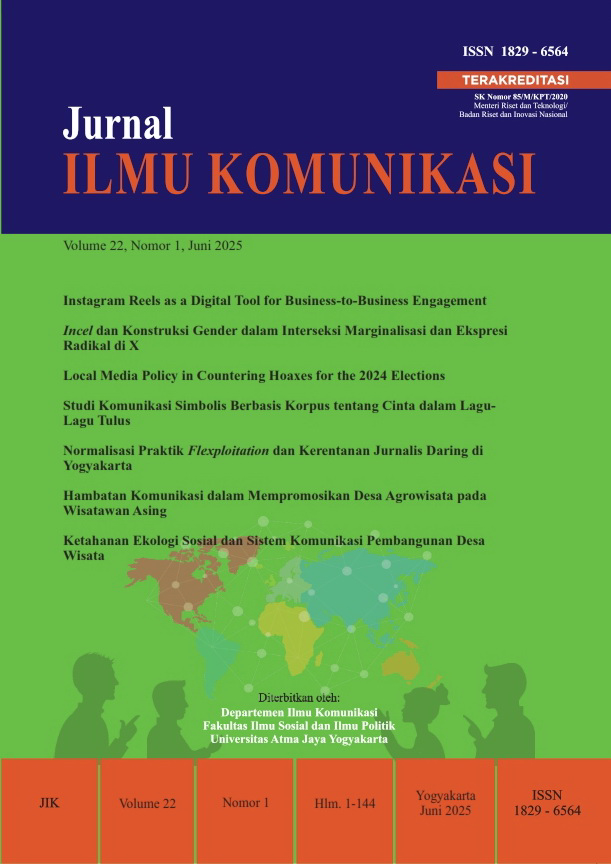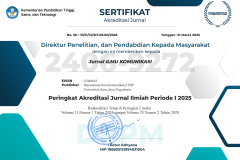Incel dan Konstruksi Gender dalam Interseksi Marginalisasi dan Ekspresi Radikal di X
DOI:
https://doi.org/10.24002/jik.v22i1.9783Keywords:
gender construction, incel, social radicalization, XAbstract
This article examines the incel phenomenon as a manifestation of radicalism and misogyny within the construction of gender in the digital era. The urgency of this study lies in the growing influence of incel narratives on X, intensifying gender polarization and the potential for gender-based violence. The research employs a qualitative method with a virtual ethnographic approach and content analysis technique. Post and public comments, as data, were collected through the Keyhole application. The findings indicate the algorithms facilitate the radicalization of masculine identity and amplify radical expressions, underscoring the need for intervention through education and responsible social media regulation.
References
Ammann, C., & Staudacher, S. (2021). Masculinities in Africa beyond crisis: Complexity, fluidity, and intersectionality. Gender, Place and Culture, 28(6), 759-768.
An, T. L., Waling, A., & Bourne, A. (2022). Men and masculinities studies in Vietnam: A brief review. Sociology Compass, 16(3), 1-15.
Andersen, J. C. (2023). The symbolic boundary work of incels: Subcultural negotiation of meaning and identity online. Deviant Behavior, 44(7), 1081-1101.
Baele, S., Brace, L., & Ging, D. (2024). A diachronic cross-platforms analysis of violent extremist language in the incel online ecosystem. Terrorism and Political Violence, 36(3), 382-405.
Benemann, H., McCartin, H., Russell, T., Cash, D., & King, A. (2023). Sadistic masculinity: Masculine honor ideology mediates sadism and aggression. Personality and Individual Differences, 206, 112118.
Brands, R. A., & Mehra, A. (2019). Gender, brokerage, and performance: A construal approach. Academy of Management Journal, 62(1), 196 - 219.
Hansen, M. B. (2018). Sexual orientation and gender identity rights lost in translation? Analyzing the UN member state disputes on international human rights recognition for sexual and gender minorities. Lambda Nordica, 23(3–4), 122-145.
Brooks, R. C., Russo-Batterham, D., & Blake, K. R. (2022). Incel activity on social media linked to local mating ecology. Psychological Science, 33(2), 249-258.
Butler, J. (2023). Selection from gender trouble: Feminism and the subversion of identity. Dalam Susan Stryker, & Dylan McCarthy Blackston (Eds.), The transgender studies reader remix (h. 191-201). New York, NY: Routledge.
Calderon-Suarez, R., Ortega-Mendoza, R. M., Montes-Y-Gomez, M., Toxqui-Quitl, C., & Marquez-Vera, M. A. (2023). Enhancing the detection of misogynistic content in social media by transferring knowledge from song phrases. IEEE Access, 11, 13179-13190.
Cinelli, M., De Francisci Morales, G., Galeazzi, A., Quattrociocchi, W., & Starnini, M. (2021). The echo chamber effect on social media. Proceedings of the National Academy of Sciences of the United States of America, 118(9), e2023301118, 1-8.
Connell, R. W., & Messerschmidt, J. W. (2005). Hegemonic masculinity: Rethinking the concept. Gender and Society, 19(6), 829-859.
Costello, W., Rolon, V., Thomas, A. G., & Schmitt, D. P. (2023). The mating psychology of incels (involuntary celibates): Misfortunes, misperceptions, and misrepresentations. Journal of Sex Research, 61(7), 989-1000.
Creswell, J. W. (2015). Penelitian kualitatif & desain riset: Memilih di antara lima pendekatan (ed. ke-3). Yogyakarta, Indonesia: Pustaka Pelajar.
Delaney, T. W., Pollet, T. V., & Cook, C. (2024). The mental well-being of involuntary celibates. Personality and Individual Differences, 218, 1-4.
Dixon, S. J. (2024, November 19). Online extremism - statistics & facts. Statista. <https://www.statista.com/topics/10291/online-extremism/#topicOverview>
du Preez, K. P., Landon, J., Mauchline, L., & Thurlow, R. (2021). A critical analysis of interventions for women harmed by others’ gambling. Critical Gambling Studies, 2(1), 1-12.
Eysenbach, G. (2020). How to fight an infodemic: The four pillars of infodemic management. Journal of Medical Internet Research, 22(6), 1-6.
Flick, U. (2019). Doing triangulation and mixed methods. SAGE Publications Ltd. <https://doi.org/10.4135/9781529716634>
Fontanesi, L., Cosi, G., Crosta, A. Di, Verrocchio, M. C., Jannini, E. A., & Ciocca, G. (2022). Involuntary celibate (incel): Validation of the incel trait scale (ITS) in the Italian male population. Journal of Psychopathology, 28(3), 113-119.
Giaccardi, S., Monique Ward, L., Seabrook, R. C., Manago, A., & Lippman, J. R. (2017). Media use and men’s risk behaviors: Examining the role of masculinity ideology. Sex Roles, 77(9-10), 581-592
Gillett, R. M., & Suzor, N. (2021, October). Incels on Reddit: A study in social norms and decentralised moderation. Paper presented at AoIR 2021: The 22ndAnnual Conference of the Association of Internet Researchers, Online Presentation. <https://doi.org/10.5210/spir.v2021i0.12171>
Glace, A. M., Dover, T. L., & Zatkin, J. G. (2021). Taking the black pill: An empirical analysis of the “incel”. Psychology of Men and Masculinity, 22(2), 288-297.
Handoyo, E. (2020). Democratic challenge in digital era. Politik Indonesia: Indonesian Political Science Review, 5(1), 66-85.
Harrington, M. (2023). Feminism against progress. Perspectives on Science and Christian Faith, 75(3), 200-201.
Hashim, S. Z, M., & Waden, J. (2023). Content-based filtering algorithm in social media. Wasit Journal of Computer and Mathematics Science, 2(1), 14-17.
Hearn, J. (2019). So what has been, is, and might be going on in studying men and masculinities?: Some continuities and discontinuities. Men and Masculinities, 22(1), 53-63.
-----------. (2022). The place and potential of crisis/crises in critical studies on men and masculinities. Global Discourse, 12(3–4), 563–585.
Johanssen, J. (2022). Reconsidering trauma and symbolic wounds in times of online misogyny and platforms. Media, Culture and Society, 45(1), 191-201.
Johnson, C. (2022). Feeling protected: Protective masculinity and femininity from Donald Trump and Joe Biden to Jacinda Ardern. Emotions and Society, 4(1), 7-26.
Joiner, T. E., & Silva, C. (2012). Why people die by suicide: Further development and tests of the interpersonal-psychological theory of suicidal behavior. Dalam P. R. Shaver, & M. Mikulincer (ed.), Meaning, mortality, and choice: The social psychology of existential concerns (h. 325-336). American Psychological Association.
Joiner, T. E., Van Orden, K. A., Witte, T. K., & Rudd, M. D. (2009). The interpersonal theory of suicide: Guidance for working with suicidal clients. American Psychological Association. <https://doi.org/10.1037/11869-000>
Kahan, D., Lamanna, D., Rajakulendran, T., Noble, A., & Stergiopoulos, V. (2019). Implementing a trauma-informed intervention for homeless female survivors of gender-based violence: Lessons learned in a large Canadian urban centre. Health and Social Care in the Community, 28(3), 1-10.
Kaylor, B. (2019). Likes, retweets, and polarization. Review & Expositor, 116(2), 183-192.
Kelly, M., DiBranco, A., & DeCook, J. R. (2022). Misogynist incels and male supremacist violence. Dalam Emily K. Carian, Alex DiBranco, & Chelsea Ebin (ed), Male supremacism in the United States: From patriarchal traditionalism to misogynist incels and the alt-right (h. 164-179). London, UK: Routledge.
Keyhole. (2024). Hashtag tracking report: #Incel on X (August 2024). <https://keyhole.co>
Kimmel, M. (2013). Angry white men: American masculinity at the end of an era. New York, NY: Nation Books.
Krippendorf, K. (2013). Content analysis: An introduction to its methodology (3rd ed). California, CA: SAGE Publications, Ltd.
Krivonos, D., & Diatlova, A. (2020). What to wear for whiteness? ‘Whore’ stigma and the East/West politics of race, sexuality and gender. Intersections East European Journal of Society and Politics, 6(3), 116-132.
Lindsay, A. (2022). Swallowing the black pill: Involuntary celibates’ (incels) anti-feminism within digital society. International Journal for Crime, Justice and Social Democracy, 11(1), 210-224.
Lounela, E., & Murphy, S. (2024). Incel violence and victimhood: Negotiating inceldom in online discussions of the Plymouth shooting. Terrorism and Political Violence, 36(3), 344-365.
Mayasari, F. (2022). Etnografi virtual fenomena cancel culture dan partisipasi pengguna media terhadap tokoh publik di media sosial. Journal of Communication and Society, 1(01), 27-44.
McNeill, M. (2023). “We dem folks . . . to be continued”: Disrupting the negative social imagery of African American youth through a close study of the to be continued brass band across screen media. Jazz and Culture, 6(2), 37-63.
Moskalenko, S., Kates, N., Fernández-Garayzábal González, J., & Bloom, M. (2022). Predictors of radical intentions among incels: A survey of 54 self-identified incels. Journal of Online Trust and Safety, 1(3), 1-21
Mulyono, B., Affandi, I., Suryadi, K., & Darmawan, C. (2023). Online civic engagement through social media: An analysis of Twitter’s big data. Cakrawala Pendidikan, 42(1), 12-26.
Naskali, P., & Kari, S. (2020). Teachers-to-be studying gender and sexual diversity. Women’s Studies International Forum, 80, 1-8.
O’Malley, R. L., Holt, K., & Holt, T. J. (2022). An exploration of the involuntary celibate (incel) subculture online. Journal of Interpersonal Violence, 37(7–8), 1-28.
Radzi, N. S. M., Bakar, K. A., & Hamid, B. D. H. A. (2021). Negotiating alternative masculinities in men’s magazines: Transitivity in the formation of counter hegemonic identities. GEMA Online Journal of Language Studies, 21(2), 153-176.
Roza, T. H., Noronha, L. T., Makrakis, M. A., Spritzer, D. T., Gadelha, A., Kessler, F. H. P., & Passos, I. C. (2023). Gaming disorder and problematic use of social media. Dalam Passos, I.C., Rabelo-da-Ponte, F.D., Kapczinski, F. (eds), Digital Mental Health: a Practitioner’s Guide (h. 237-253). Cham, Switzerland: Springer Nature Switzerland AG.
Saurwein, F., Brantner, C., & Möck, L. (2023). Responsibility networks in media discourses on automation: A comparative analysis of social media algorithms and social companions. New Media and Society, 27(3), 1752-1773.
Shesterina, A. M., & Fedosova, O. A. (2021). Promotion of feminist ideas in Instagram texts. Vestnik Moskovskogo Universiteta. Seriya 10. Zhurnalistika, 4, 114-134.
Song, X., Guo, S., & Gao, Y. (2024). Personality traits and their influence on echo chamber formation in social media: A comparative study of Twitter and Weibo. Frontiers in Psychology, 15, 1-14.
Sparks, B., Zidenberg, A. M., & Olver, M. E. (2022). Involuntary celibacy: A review of incel ideology and experiences with dating, rejection, and associated mental health and emotional sequelae. Current Psychiatry Reports, 24(12), 731-740.
Sunderland, J. (2023). Fighting for masculine hegemony: Contestation between alt-right and white nationalist masculinities on Stormfront. Men and Masculinities, 26(1), 3-23.
Tastenhoye, C. A., Ross, N. E., Dupré, J., Bodnar, T. V., & Friedman, S. H. (2022). Involuntary celibates and forensic psychiatry. Journal of the American Academy of Psychiatry and the Law, 50(3), 440-449.
Terren, L., & Borge, R. (2021). Echo chambers on social media: A systematic review of the literature. Review of Communication Research, 9, 99-118.
Thorburn, J. (2023). Exiting the manosphere. A gendered analysis of radicalization, diversion and deradicalization narratives from r/IncelExit and r/ExRedPill. Studies in Conflict and Terrorism, 1-25.
Thorburn, J., Powell, A., & Chambers, P. (2023). A world alone: Masculinities, humiliation and aggrieved entitlement on an incel forum. British Journal of Criminology, 63(1), 238–254.
Tietjen, R. R., & Tirkkonen, S. K. (2023). The rage of lonely men: Loneliness and misogyny in the online movement of “involuntary celibates” (incels). Topoi, 42(5), 1229-1241.
Vink, D., Abbas, T., Veilleux-Lepage, Y., & McNeil-Willson, R. (2023). “Because they are women in a man’s world”: A critical discourse analysis of incel violent extremists and the stories they tell. Terrorism and Political Violence, 36(6), 723-739.
Walker, S. M., & Watkins, D. V. (2022). Followers. Dalam Steven M. Walker & Daryl Watkins, Toxic leadership: Research and cases (h. 103-117). New York, NY: Routledge
Webber, G. R., & Giuffre, P. (2019). Women’s relationships with women at work: Barriers to solidarity. Sociology Compass, 13(6), 1-13.
Wedgwood, N., Connell, R., & Wood, J. (2022). Deploying hegemonic masculinity: A study of uses of the concept in the Journal Psychology of Men & Masculinities. Psychology of Men and Masculinity, 24(2), 83–93.
Downloads
Published
How to Cite
Issue
Section
License

This work is licensed under a Creative Commons Attribution 4.0 International License.
Jurnal ILMU KOMUNIKASI is an academic journal. As such, it is dedicated to the open exchange of information. For this reason, JIK is freely available to individuals and institutions. Authors who publish in Jurnal ILMU KOMUNIKASI will release their articles under the Creative Commons Attribution (BY) License. This license allows anyone to copy and redistribute the article in any medium or format as well as remix, transform, and build upon the material for any purpose, even commercially as long as they credit the authors for the original creation. For details of the rights authors grants users of their work, see the "human-readable summary" of the license, with a link to the full license. (Note that "you" refers to a user, not an author, in the summary)
 This work is licensed under a Creative Commons Attribution 4.0 International License.
This work is licensed under a Creative Commons Attribution 4.0 International License.














